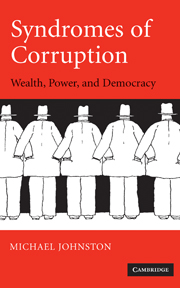Book contents
- Frontmatter
- Contents
- List of figures
- List of tables
- Preface
- 1 Wealth, power, and corruption
- 2 The international setting: power, consensus, and policy
- 3 Participation, institutions, and syndromes of corruption
- 4 Influence Markets: influence for rent, decisions for sale
- 5 Elite Cartels: how to buy friends and govern people
- 6 Oligarchs and Clans: we are family – and you're not
- 7 Official Moguls: reach out and squeeze someone
- 8 From analysis to reform
- Appendix A Countries in each cluster and distances from statistical cluster centers
- Appendix B Statistical indicators for country clusters
- References
- Index
2 - The international setting: power, consensus, and policy
Published online by Cambridge University Press: 22 September 2009
- Frontmatter
- Contents
- List of figures
- List of tables
- Preface
- 1 Wealth, power, and corruption
- 2 The international setting: power, consensus, and policy
- 3 Participation, institutions, and syndromes of corruption
- 4 Influence Markets: influence for rent, decisions for sale
- 5 Elite Cartels: how to buy friends and govern people
- 6 Oligarchs and Clans: we are family – and you're not
- 7 Official Moguls: reach out and squeeze someone
- 8 From analysis to reform
- Appendix A Countries in each cluster and distances from statistical cluster centers
- Appendix B Statistical indicators for country clusters
- References
- Index
Summary
New life for an old issue
Corruption is back on the international agenda after a generation's absence because important economic and political interests put it there. Policymakers have changed the ways we pursue international development and reform, while international businesses and the governments that increasingly have a stake in their success have extended their reach both in the world economy and in policy debates. Scholars and advocacy groups have produced important new theories and data that have moved us beyond old conundrums regarding corruption. Many of these activities reflect business- and trade-oriented worldviews, organizational interests, and analytical outlooks advocating liberalized markets and politics, in that order.
With respect to corruption this worldview and the power behind it have at least three major implications. First, and most visible, is the general trend toward liberalization and privatization of economic activity, along with the withdrawal of the state into more limited and technical kinds of functions, that has marked global development for a generation. Those changes affect the ways people pursue, use, and exchange both wealth and power and, as we shall see, shape corruption syndromes in critical ways. Second, businesses based in affluent countries play major roles in the corruption that occurs in developing societies, often with the blessings of their home governments: until recently some affluent societies allowed their international businesses to deduct foreign bribe payments from their tax bills. Third, a new consensus has emerged over corruption's origins, consequences, and remedies.
- Type
- Chapter
- Information
- Syndromes of CorruptionWealth, Power, and Democracy, pp. 16 - 35Publisher: Cambridge University PressPrint publication year: 2005



